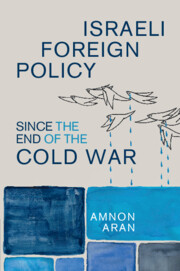Book contents
- Israeli Foreign Policy since the End of the Cold War
- Cambridge Middle East Studies
- Israeli Foreign Policy since the End of the Cold War
- Copyright page
- Dedication
- Contents
- Maps
- Figures
- Acknowledgements
- Chronology
- Abbreviations
- Maps
- Introduction
- 1 Entrenchment
- 2 Redirection
- 3 On the Brink of Peace?
- 4 Engagement Incomplete
- 5 Engagement under Assault
- 6 The Dividends of Engagement
- 7 Unpicking the Oslo Accords
- 8 Backtracking
- 9 Just Beyond Reach
- 10 Between Engagement and Unilateralism
- 11 In Search of a Foreign Policy Paradigm
- 12 A Perfect Storm
- 13 The Road Map for Regime Change
- 14 The Resurgence of Unilateralism
- 15 Events Dear Boy, Events
- 16 The End of the Road
- 17 Vulnerable Ties
- Epilogue: Israel’s Wondrous Decade?
- Appendix List of Persons Interviewed
- References
- Index
- Books in the Series
6 - The Dividends of Engagement
Published online by Cambridge University Press: 15 December 2020
- Israeli Foreign Policy since the End of the Cold War
- Cambridge Middle East Studies
- Israeli Foreign Policy since the End of the Cold War
- Copyright page
- Dedication
- Contents
- Maps
- Figures
- Acknowledgements
- Chronology
- Abbreviations
- Maps
- Introduction
- 1 Entrenchment
- 2 Redirection
- 3 On the Brink of Peace?
- 4 Engagement Incomplete
- 5 Engagement under Assault
- 6 The Dividends of Engagement
- 7 Unpicking the Oslo Accords
- 8 Backtracking
- 9 Just Beyond Reach
- 10 Between Engagement and Unilateralism
- 11 In Search of a Foreign Policy Paradigm
- 12 A Perfect Storm
- 13 The Road Map for Regime Change
- 14 The Resurgence of Unilateralism
- 15 Events Dear Boy, Events
- 16 The End of the Road
- 17 Vulnerable Ties
- Epilogue: Israel’s Wondrous Decade?
- Appendix List of Persons Interviewed
- References
- Index
- Books in the Series
Summary
Chapter 6 shifts the focus from Israeli foreign policy towards the Middle East, to its ties with established and emerging world powers: China, India, the USA, and the EU. Each section provides a brief historical background to these bilateral relations, followed by an analysis of how the shift from entrenchment to engagement affected Israel’s ties with world powers. The examination contributes to the literature by showing how this shift played a decisive role in consolidating Israel’s post-Cold War relations with the EU and the USA. It demonstrates, also, that it precipitated the formation of close political and economic ties between Israel and China and between Israel and India, which, during the Cold War, had all but severed their diplomatic relations with Israel. This is the first analysis demonstrating the link between Israel’s foreign policy of engagement towards the Middle East and its bilateral ties with world powers beyond the region.
- Type
- Chapter
- Information
- Israeli Foreign Policy since the End of the Cold War , pp. 124 - 147Publisher: Cambridge University PressPrint publication year: 2020

